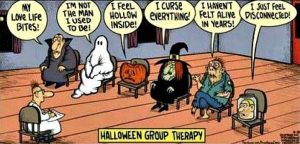When relationships face challenges, professional guidance can make all the difference. For couples in St. George, Utah, seeking to strengthen their bond, resolve conflicts, or navigate difficult transitions, marriage counseling provides a supportive environment for growth and healing.
This comprehensive guide highlights the top marriage counseling services in St. George, offering valuable insights into what makes effective therapy and how to find the right counselor for your specific needs. Whether you’re experiencing communication breakdowns, trust issues, or simply want to enhance your relationship, these licensed professionals can help you build a stronger foundation for your marriage.
What is Marriage Counseling?
Marriage counseling, also known as couples therapy, is a form of psychotherapy that helps couples recognize and resolve conflicts, improve communication, and strengthen their relationships. Unlike individual therapy, marriage counseling focuses on the relationship dynamic as a whole, treating the partnership itself as the patient.
During sessions, a trained therapist works with both partners to:
- Identify problematic patterns in the relationship
- Develop effective communication strategies
- Process unresolved emotions
- Establish healthy boundaries
- Build conflict resolution skills
- Deepen emotional intimacy
- Create shared goals for the future
Most marriage counselors employ evidence-based approaches such as Emotionally Focused Therapy (EFT), Gottman Method, or Integrative Behavioral Couples Therapy (IBCT). These therapeutic frameworks have been extensively researched and proven effective for helping couples create lasting positive change.
Best Marriage Counseling in St. George, Utah
1. Holobeing Health and Wellness
Address: 230 N 1680 E Suite I-1, St. George, UT 84790, United States
Phone: +1 435-215-2970
Website: holobeinghealthandwellness.com
Holobeing Health and Wellness stands out as St. George’s premier marriage counseling service, offering comprehensive therapy for couples seeking to enhance their relationship or navigate challenges. Led by Jay, MA, LMFT, the practice brings extensive experience in couples dynamics and specialized therapeutic approaches.
What distinguishes Holobeing is its integrative approach to relationship healing. They combine evidence-based techniques with personalized strategies tailored to each couple’s unique circumstances. Jay’s training in EMDR (Eye Movement Desensitization and Reprocessing) provides additional tools for addressing trauma that may affect relationship patterns, creating deeper healing opportunities for couples.
Areas of Expertise:
- Communication enhancement strategies
- Conflict resolution skills
- Trust rebuilding after infidelity
- Emotional intimacy development
- Pre-marital counseling
- Blended family navigation
- Sexual intimacy issues
- Trauma-informed couples therapy using EMDR
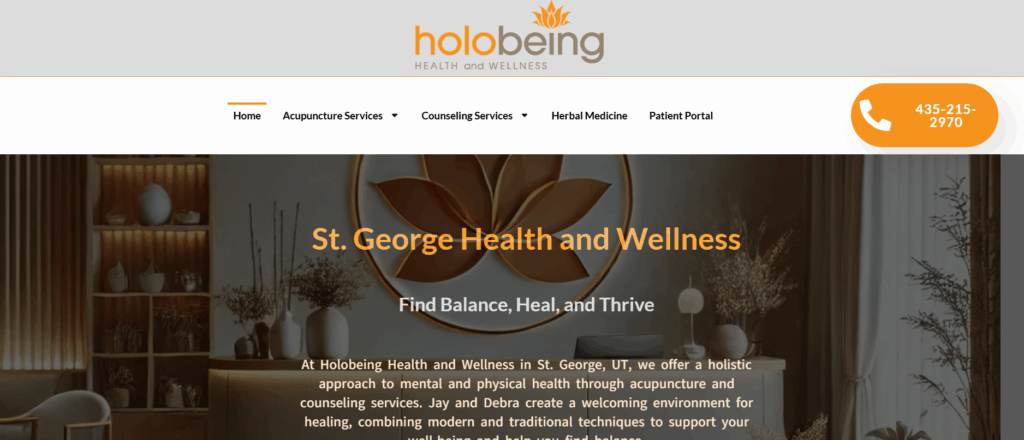
2. Resilient Life Counseling
Address: 348 N Bluff St #104, St. George, UT 84770
Phone: (435) 767-1120
Website: https://www.resilientlifeutah.com/
Resilient Life Counseling provides compassionate, skill-based marriage therapy in a comfortable setting. Founded by Heather Thompson, LMFT, the practice emphasizes developing practical tools that couples can implement immediately while working toward deeper relationship transformation.
Their approach focuses on helping couples identify and break negative interaction cycles that create distance and conflict. With specialized training in Emotionally Focused Therapy (EFT), the counselors help partners reconnect with their attachment needs and develop more secure emotional bonds.
Areas of Expertise:
- Emotionally Focused Therapy (EFT)
- Communication skills development
- Managing differences in parenting styles
- Navigating major life transitions
- Affair recovery
- Managing the impact of chronic illness on relationships
- Premarital counseling
- Religious faith integration in therapy, when desired
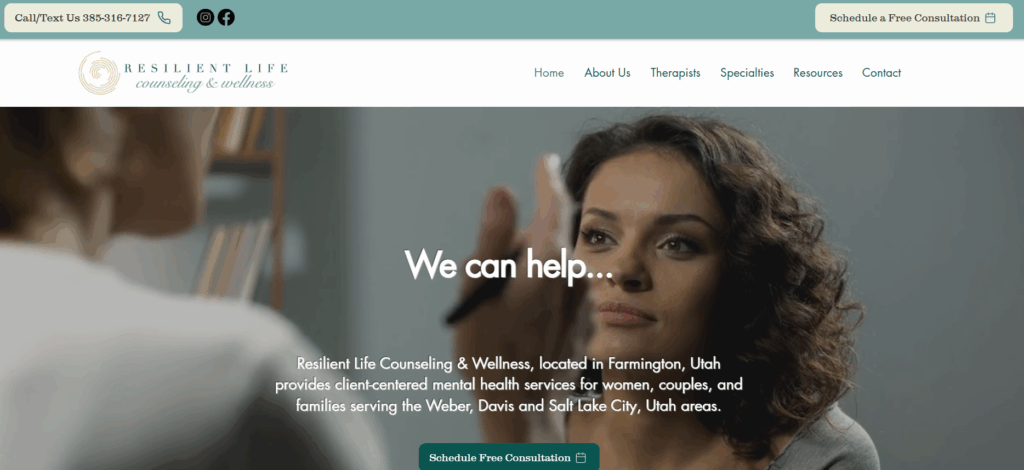
3. Red Rock Counseling
Address: 1664 S Dixie Dr #D-103, St. George, UT 84770
Phone: (435) 767-1153
Website: redrockcounseling.com
Red Rock Counseling offers specialized couples therapy in a warm, supportive environment. Founded by Dr. Kendra Lester, PhD, LMFT, the practice brings a research-informed approach to helping couples build stronger connections and resolve persistent conflicts.
Their therapeutic model incorporates principles from the highly regarded Gottman Method, allowing couples to identify destructive patterns while building friendship, managing conflict constructively, and creating shared meaning. The practice is particularly skilled at helping couples recover from significant relationship injuries and rebuild trust.
Areas of Expertise:
- Gottman Method couples therapy
- Rebuilding trust after betrayal
- Communication breakdown repair
- Intimacy enhancement
- Conflict management skills
- Managing external stress impacts on the relationship
- Military couples and deployment issues
- Retirement and empty nest transitions
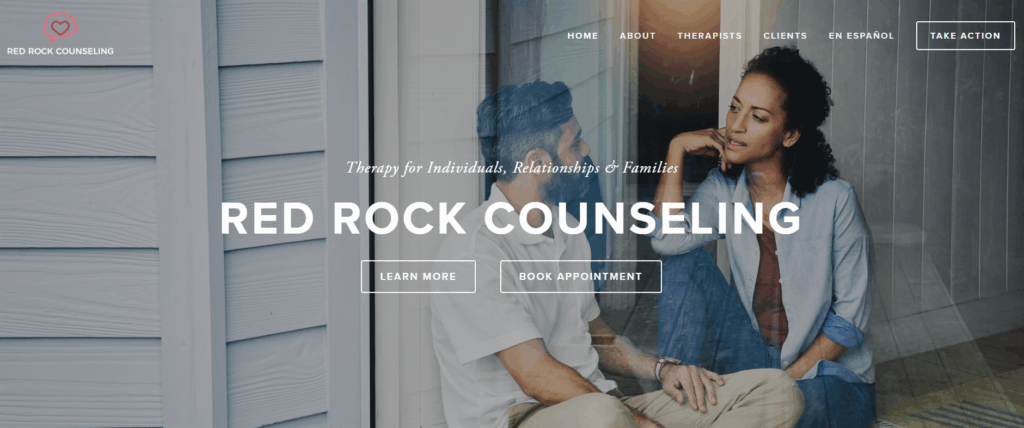
4. Desert Bloom Counseling Center
Address: 393 E Riverside Dr #3A, St. George, UT 84790
Phone: (435) 673-2219
Website: desertbloomcounseling.com
Desert Bloom Counseling Center provides couples with evidence-based therapeutic approaches designed to address both immediate concerns and long-term relationship patterns. Led by Michael Jensen, LCSW, their team specializes in helping couples navigate complex challenges including communication breakdowns, emotional disconnection, and intimacy issues.
The center integrates cognitive-behavioral techniques with attachment theory frameworks, helping couples understand how early life experiences influence their current relationship dynamics. This approach facilitates deeper understanding and compassion between partners.
Areas of Expertise:
- Attachment-focused couples therapy
- Cognitive-behavioral approaches for relationships
- Strengthening emotional connection
- Managing anger and high-conflict situations
- Anxiety and depression impact on marriage
- Recovering from emotional neglect
- Effective co-parenting strategies
- Cultural and religious considerations in relationships
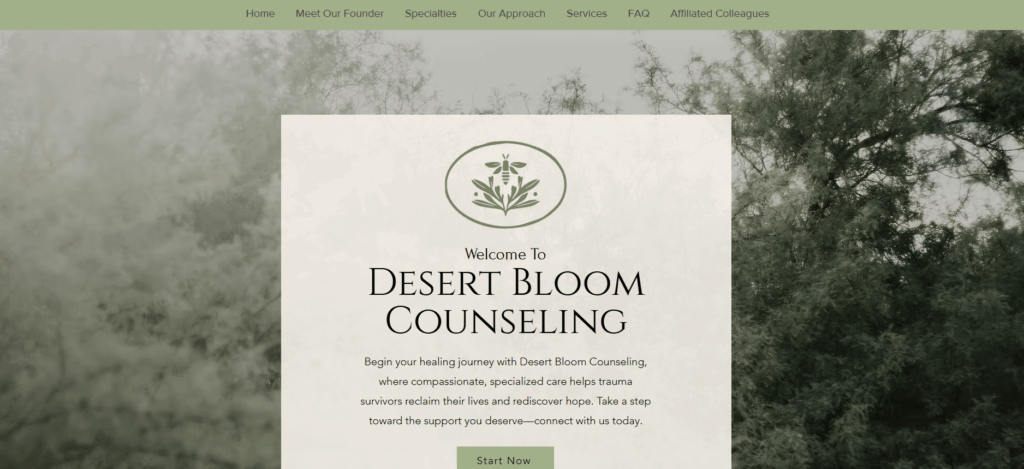
5. Desert Bloom Healthcare
Address: 1664 S Dixie Dr #D101, St. George, UT 84770
Phone: (435) 627-1185
Website: https://desertbloomhealthcare.com/
Desert Bloom Healthcare offers specialized marriage counseling with particular expertise in relationships affected by addiction, mental health challenges, or trauma. Their integrated approach addresses both individual healing and relationship repair, recognizing that personal well-being and relationship health are interconnected.
The practice provides a unique blend of evidence-based therapeutic modalities tailored to each couple’s specific circumstances. Their holistic approach addresses emotional, mental, physical, and spiritual dimensions of relationship healing.
Areas of Expertise:
- Addiction’s impact on relationships
- Trauma-informed couples therapy
- Mental health conditions and marriage
- Codependency patterns
- Recovery support for couples
- Communication during a crisis
- Rebuilding safety and trust
- Self-care balance within relationships
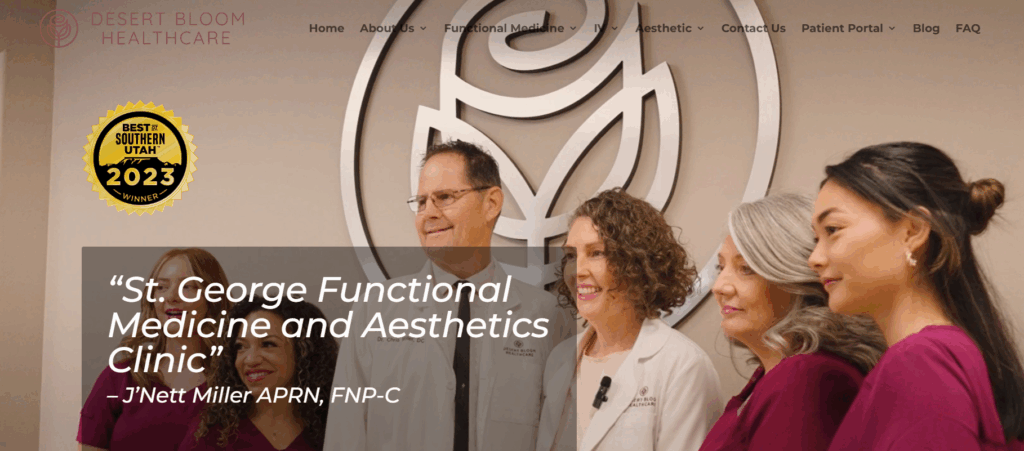
6. Southwest Behavioral Health Center
Address: 474 W 200 N, St. George, UT 84770
Phone: (435) 634-5600
Website: sbhc.us
Southwest Behavioral Health Center provides accessible marriage counseling services through their family therapy program. As a community-based mental health center, they offer sliding scale fees and accept most insurance plans, making quality couples therapy available to diverse socioeconomic backgrounds.
Their marriage counseling services focus on practical skill-building and problem-solving approaches. The center employs multiple licensed therapists with various specializations, allowing them to match couples with professionals whose expertise aligns with their specific needs.
Areas of Expertise:
- Affordable therapy options
- Crisis intervention for couples
- Communication skills development
- Mental health impacts on relationships
- Conflict de-escalation techniques
- Family systems approaches
- Parenting challenges within marriage
- Financial stress management
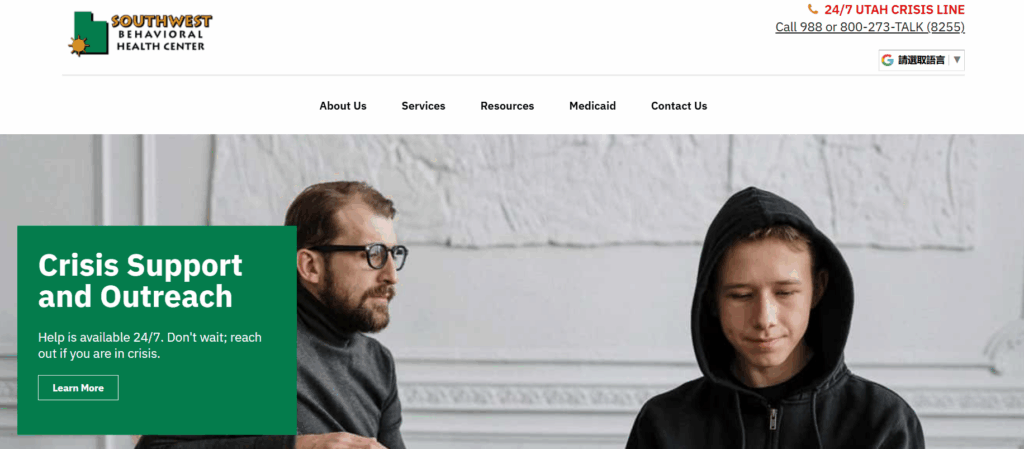
7. Flourish Therapy & Wellness
Address: 368 E Riverside Dr #10, St. George, UT 84790
Phone: (435) 922-4900
Website: https://www.flourishtherapy.org/
Flourish Therapy & Wellness specializes in helping couples revitalize their relationships through evidence-based therapeutic approaches. Founded by Rebecca Anderson, LMFT, the practice emphasizes creating emotional safety and rebuilding connection as foundations for relationship repair and growth.
Their therapeutic approach incorporates elements from multiple established couples therapy models, including Emotionally Focused Therapy and the Gottman Method. This integrated framework allows for tailored interventions that address each couple’s unique dynamics and concerns.
Areas of Expertise:
- Emotional disconnection and repair
- Blended family relationship challenges
- Navigating life transitions
- Sexual intimacy concerns
- Communication pattern interruption
- Affection and romance rebuilding
- Empty nest adjustment
- Cultural and religious dimensions of relationships

8. Sage Counseling Center
Address: 1760 N Main St #201, St. George, UT 84770
Phone: (435) 674-2690
Website: https://www.sagecirclecc.com/
Sage Counseling Center offers specialized marriage therapy with a focus on helping couples develop greater emotional intelligence within their relationships. Founded by Dr. James Wilson, PsyD, the practice brings a psychological depth to couples work while maintaining practical application.
Their approach emphasizes understanding attachment styles and how these influence relationship patterns. By helping couples identify their attachment needs and fears, the counselors facilitate more secure emotional bonds and healthier interaction patterns.
Areas of Expertise:
- Attachment-based couples therapy
- Emotional regulation in relationships
- Breaking negative interaction cycles
- Rebuilding after betrayal or affairs
- Anxiety and depression impact on marriage
- Managing extended family conflicts
- Life stage transitions
- Identity issues within relationships
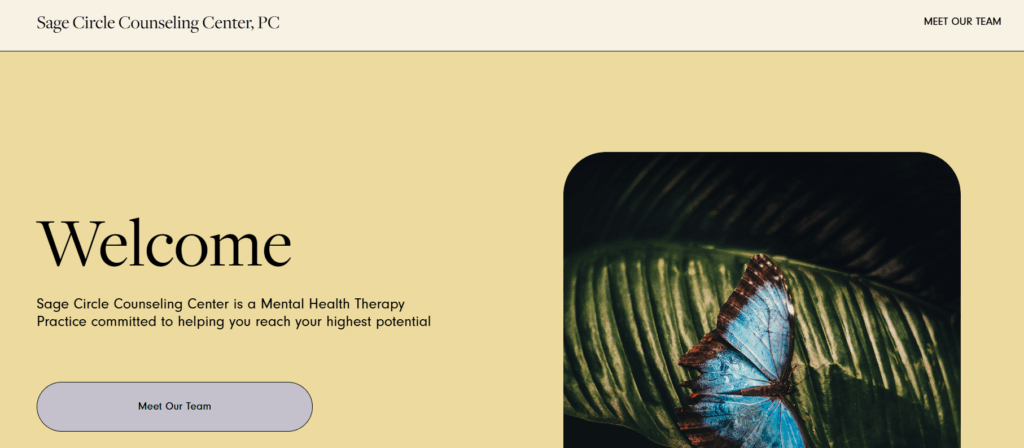
9. New Horizons Counseling
Address: 1812 W Sunset Bld #21, St. George, UT 84770
Phone: (435) 215-5055
Website: https://www.nhcc.us/
New Horizons Counseling specializes in marriage therapy that addresses both immediate relationship concerns and deeper emotional patterns. Founded by Maria Rodriguez, LCSW, the practice helps couples move beyond symptom management to create lasting relational change.
Their therapeutic approach incorporates principles from Internal Family Systems therapy, helping partners understand how their individual parts (inner critic, protector, wounded child) influence their relationship dynamics. This framework promotes greater self-awareness and compassion for both self and partner.
Areas of Expertise:
- Internal Family Systems approach to relationships
- Cross-cultural relationship dynamics
- Communication pattern transformation
- Intimacy enhancement
- Grief and loss within relationships
- Managing differences in values or goals
- Self-differentiation within marriage
- Work-life balance for couples
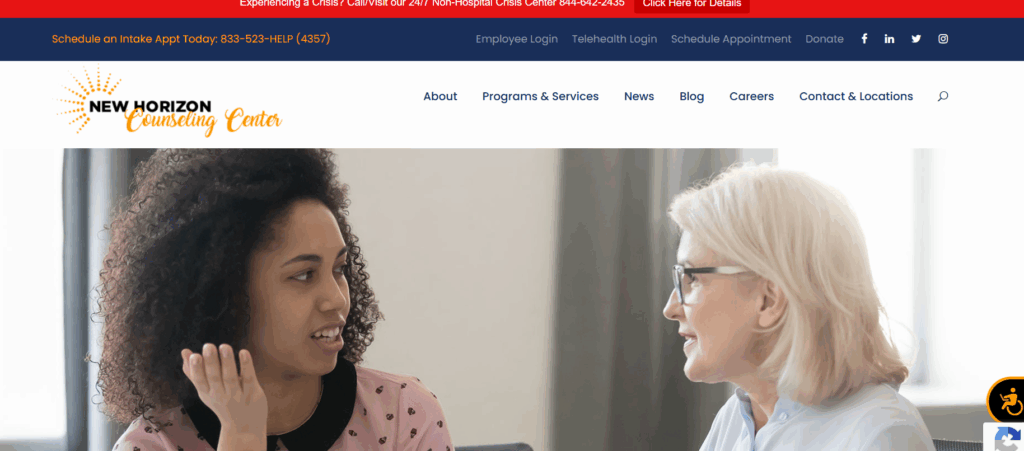
What Makes a Great Marriage Counselor?
Finding the right marriage counselor can significantly impact your therapy experience and outcomes. Here are key qualities to look for when selecting a marriage counseling professional:
Proper Credentials and Specialized Training
Great marriage counselors have advanced degrees in counseling, psychology, or related fields, along with specific training in couples therapy. Look for credentials like Licensed Marriage and Family Therapist (LMFT), Licensed Clinical Social Worker (LCSW), or Licensed Professional Counselor (LPC). Additionally, specialized training in established couples therapy methodologies distinguishes exceptional counselors from generalists.
Experience Working with Couples
Experience matters significantly in couples therapy. Seasoned counselors have encountered diverse relationship challenges and developed effective strategies for addressing them. They understand the nuances of relationship dynamics and recognize patterns that less experienced therapists might miss.
Objectivity and Neutrality
Effective marriage counselors maintain neutrality, avoiding taking sides or assigning blame. They create a balanced environment where both partners feel heard, validated, and supported. This neutrality fosters trust in the therapeutic process and allows couples to work through issues without feeling defensive.
Strong Communication Skills
Great counselors model the communication skills they teach. They listen actively, ask insightful questions, and provide clear, compassionate feedback. Their ability to facilitate productive conversations helps couples develop these same skills for use outside therapy.
Cultural Competence and Respect for Values
Marriage exists within cultural and religious contexts that significantly influence relationship expectations and dynamics. Excellent counselors respect these dimensions and adapt their approach accordingly, working within couples’ value systems rather than imposing their own perspectives.
Commitment to Continued Learning
The field of couples therapy continuously evolves with new research and methodologies. The best counselors stay updated on advances in the field through ongoing education, supervision, and professional development.
Benefits of Marriage Counseling
Marriage counseling offers numerous advantages for couples at any stage in their relationship. Research consistently demonstrates that professional therapy can help couples achieve significant improvements in relationship satisfaction and stability. Here are the key benefits:
Improved Communication
Perhaps the most common reason couples seek therapy is communication difficulties. Marriage counseling provides a structured environment where partners learn to express themselves clearly and listen effectively. Counselors teach specific techniques to prevent misunderstandings, reduce defensiveness, and facilitate productive discussions even during disagreements.
Conflict Resolution Skills
All relationships experience conflict, but how couples handle disagreements determines relationship health. Marriage counseling equips couples with effective strategies for resolving disputes constructively, including:
- Identifying underlying issues beneath surface arguments
- Managing emotional reactivity during discussions
- Finding compromise and win-win solutions
- Repairing after conflicts
- Preventing the escalation of minor disagreements
Deepened Emotional Intimacy
Many couples experience emotional distance over time as daily responsibilities take precedence over connection. Marriage counseling helps partners reconnect emotionally by:
- Creating safe spaces for vulnerability
- Developing empathy for each other’s experiences
- Understanding each other’s emotional needs
- Building rituals of connection
- Enhancing emotional support systems
Restored Trust and Healing
When relationships experience betrayal (whether through infidelity, financial dishonesty, or broken promises), rebuilding trust requires structured support. Marriage counselors provide guidance through the complex process of acknowledgment, accountability, forgiveness, and rebuilding, creating a path toward healing that might be difficult to navigate independently.
Strengthened Commitment
The process of working through challenges together in therapy often strengthens couples’ commitment to each other and their relationship. By investing in professional help, partners demonstrate their dedication to improvement and growth, which itself can increase relationship satisfaction.
Prevention of Future Problems
Couples who develop communication and conflict resolution skills through counseling are better equipped to handle future challenges. These preventative benefits extend beyond the immediate issues that brought them to therapy, creating relationship resilience for years to come.
Individual Growth Within the Relationship
Effective marriage counseling supports not only relationship health but also individual well-being. Partners often experience personal growth through the therapy process, including improved emotional regulation, greater self-awareness, and enhanced relationship skills that benefit all interpersonal connections.
Common Reasons to Seek Marriage Counseling
Couples seek professional counseling for various reasons, and early intervention often leads to better outcomes. Here are common situations where marriage counseling can be particularly beneficial:
Communication Breakdowns
When conversations consistently escalate into arguments or partners feel chronically misunderstood, a communication breakdown has likely occurred. Signs include:
- Frequent miscommunications
- Feeling unheard or invalidated
- Conversations that quickly become heated
- Avoidance of important discussions
- Inability to resolve even minor issues
Infidelity or Trust Violations
Betrayals of trust, whether through physical affairs, emotional infidelity, or dishonesty in other areas, create significant relationship wounds. Professional guidance helps couples:
- Process the initial crisis
- Understand contributing factors
- Rebuild transparency and honesty
- Work through forgiveness
- Establish new relationship boundaries
Major Life Transitions
Significant life changes can strain even strong relationships. Marriage counseling helps couples navigate transitions such as:
- Becoming parents
- Career changes or job loss
- Relocation
- Health diagnoses
- Empty nest adjustments
- Retirement
- Caring for aging parents
Sexual Intimacy Issues
When physical intimacy becomes a source of conflict or disconnection, couples often benefit from professional support to address:
- Mismatched desire levels
- Sexual dysfunction
- Intimacy after trauma
- Reconnecting physically after periods of distance
- Communication about physical needs and preferences
Financial Conflicts
Money disagreements rank among the most common sources of relationship stress. Counseling helps partners:
- Understand different money values and histories
- Develop fair financial decision-making processes
- Address financial infidelity or dishonesty
- Create sustainable financial plans that respect both partners’ needs
- Navigate financial hardships together
Parenting Disagreements
Different parenting approaches can create significant relationship strain. Marriage counseling helps parents:
- Understand the origins of their parenting styles
- Develop consistent approaches
- Support each other’s parenting efforts
- Present a united front with children
- Balance parenting responsibilities with couple connection
Emotional Disconnection
When partners feel like “roommates” rather than connected partners, emotional disconnection has likely occurred. Signs include:
- Lack of meaningful conversation
- Minimal physical affection
- Parallel rather than shared lives
- Feeling lonely despite being together
- Seeking emotional connection elsewhere
Considering Separation
For couples contemplating separation, counseling provides clarity and support through:
- Determining if the relationship can be salvaged
- Understanding relationship patterns to avoid repeating them
- Processing grief and loss if the separation proceeds
- Creating amicable separation plans when necessary
- Supporting healthy co-parenting arrangements
What to Expect: Timeframe for Marriage Counseling
The duration of marriage counseling varies significantly based on the couple’s specific challenges, goals, and commitment to the process. Understanding typical timeframes can help set realistic expectations:
Initial Assessment Phase (1-3 Sessions)
Most marriage counseling begins with an assessment period where the therapist:
- Gathers relationship history
- Identifies key concerns from both partners
- Observes interaction patterns
- Discusses goals for therapy
- Develops a preliminary treatment plan
Some therapists conduct individual sessions with each partner during this phase in addition to conjoint sessions.
Active Treatment Phase (Variable)
The main therapeutic work occurs during this phase, which typically follows these general timelines:
Short-Term Therapy (8-12 Sessions)
- Appropriate for: Specific issues, communication enhancement, and minor conflicts
- Focus: Practical skill-building and immediate problem-solving
- Timeline: Typically 2-3 months of weekly sessions
Moderate-Length Therapy (12-24 Sessions)
- Appropriate for: Deeper relationship patterns, trust rebuilding, moderate disconnection
- Focus: Addressing underlying dynamics while building practical skills
- Timeline: Approximately 3-6 months of weekly or biweekly sessions
Longer-Term Therapy (24+ Sessions)
- Appropriate for: Significant relationship trauma, chronic conflict patterns, severe disconnection
- Focus: Transforming fundamental relationship dynamics and individual patterns
- Timeline: 6+ months, often with gradually decreasing frequency
Maintenance Phase (As Needed)
After completing the primary therapeutic work, many couples transition to:
- Monthly “tune-up” sessions
- Quarterly check-ins
- As-needed appointments during stressful periods or transitions
Intensive Options
Some couples opt for intensive therapy formats rather than weekly sessions:
- Weekend intensives (10-15 hours over 2-3 days)
- Week-long retreats
- Multiple sessions per week for a condensed period
These approaches can accelerate progress for couples who prefer concentrated work or have scheduling constraints.
Factors Affecting Timeline
Several variables influence how long marriage counseling takes:
- Severity and duration of problems
- Presence of individual mental health issues
- Willingness to complete homework between sessions
- Consistency in attending appointments
- Openness to change and feedback
- External stressors affecting the relationship
- Whether there has been a significant breach of trust
How to Choose the Right Marriage Counselor for Your Needs
Finding the right fit in a marriage counselor significantly impacts therapy success. Consider these important factors when selecting a professional in St. George:
Assess Specialized Training
Look beyond general licensure to specialized couples therapy training:
- Gottman Method certification (Levels 1-3)
- Emotionally Focused Therapy (EFT) certification
- PREPARE/ENRICH facilitator certification
- Discernment Counseling training
- Specialized sexual therapy training if relevant
Consider Theoretical Approach
Different therapeutic approaches resonate with different couples:
- Emotionally Focused Therapy: Focuses on attachment and emotional connection
- Gottman Method: Emphasizes friendship, conflict management, and shared meaning
- Imago Relationship Therapy: Explores childhood influences on relationship patterns
- Solution-Focused Brief Therapy: Emphasizes practical solutions and future focus
- Integrative approaches: Combine multiple methodologies
Evaluate Personal Compatibility
The relationship with your counselor matters greatly:
- Schedule initial consultations with 2-3 potential therapists
- Assess communication style and personality fit
- Ensure both partners feel comfortable with the counselor
- Consider whether you prefer a direct or more gentle approach
- Discuss spiritual or cultural factors if important to you
Practical Considerations
Logistical factors influence consistency and sustainability:
- Location convenience in St. George
- Available appointment times
- Telehealth options if needed
- Fee structure and insurance acceptance
- Session length options
Research Reputation
Gather information about potential counselors:
- Online reviews (while recognizing their limitations)
- Referrals from trusted sources
- Professional credentials verification
- Years of experience with couples specifically
- Success with issues similar to yours
Conclusion
Investing in marriage counseling can transform your relationship, providing tools and insights for deeper connection and more effective conflict resolution. St. George offers numerous qualified professionals who can guide you through this process, with Holobeing Health and Wellness standing out for their comprehensive, personalized approach to couples therapy.
Whether you’re facing specific challenges or simply want to strengthen your relationship foundation, reaching out to a marriage counselor represents a proactive step toward a more fulfilling partnership. With the right professional guidance, couples can overcome obstacles, enhance communication, and build a stronger, more resilient relationship for years to come.
Marriage counseling isn’t just for relationships in crisis—it’s for any couple wanting to invest in their shared future. By understanding what to expect and choosing the right counselor for your specific needs, you can maximize the benefits of this valuable resource available in St. George.

